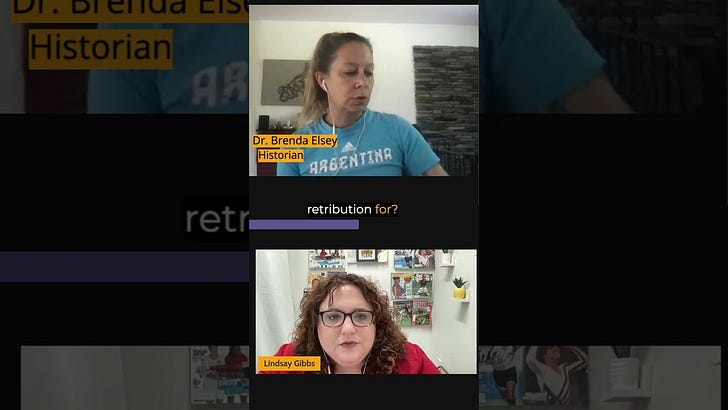Support in women's sports can't be contingent on success
You shouldn't have to be the best to deserve the best.
Hi, friends. Thanks so much for supporting Power Plays. I wanted to remind you that subscriptions are 23% off for the remainder of the World Cup. Thanks for helping make this work possible. -Lindsay
Parsing the 2023 USWNT’s legacy
Well, it happened. The USWNT lost at the World Cup, falling to Sweden in penalty kicks in the Round of 16.
We knew this day was coming, sooner or later. In part because of how disjointed the team has looked lately. In part because of how rapidly talent and investment is growing globally in women’s soccer.
But predominantly, we knew this was coming because it’s sport, and losing is part of it.
Of course, that doesn’t make it any less painful. It was excruciating to watch the team that has been such an unbridled source of joy over the last decade look like a shell of itself over the last fortnight. It was soul-crushing on Sunday to see a synergy that had been missing all tournament finally surface, solely to be stymied by Sweden’s spectacular goalkeeper, Zećira Mušović, stop by stop. It was mind-numbing to watch the scoreless seconds go by, first in regular time, and then in two extra periods, knowing the impossible was becoming more probable with every tick. It was downright inhumane for it to all come down to penalty kicks; for the penalty kicks to start so well for the USWNT, only for it to come down to misses by three of the steadiest feet under pressure we have: Sophia Smith, Megan Rapinoe, and Kelley O’Hara. It was – and still is, days later – inconceivable that the game actually ended on an Alyssa Naehr stop that VAR revealed actually crossed the goal line by a millimeter, if that.
So, where does this leave us? We are, of course, swimming in bad-faith attacks by conservatives who are reveling in the USWNT’s (and Megan Rapinoe’s, in particular) failures, because they find strong, brave women playing elite sport and fighting for a better country for people of color and the LGBTQ community terrifying beyond belief. We are waiting on the inevitable firing of head coach Vlatko Androvski and (likely) general manager Kate Markgraf, who hopefully will go on to have long and fruitful careers far away from the national team. We are devouring the necessary post-mortems and rueing all the potential left on the sidelines. (Or, at least, I am)
But ultimately, we’re left thinking about legacies. Not individual legacies, that’s a whole separate newsletter that I’m nowhere near emotionally healthy enough to write. But rather, the legacy of this particular team as a whole. The 2015 team’s legacy was re-establishing the team as champions. The 2019 team’s legacy was equal pay.
The easy answer would be that the 2023 legacy is an embarrassing loss, the end — or at least pause — of a dynasty. But I hope there ends up being more to it.
I hope this team’s legacy is that you don’t have to win in women’s sports in order to receive the proper investment. I hope they prove that support doesn’t disappear the second the championship isn’t defended. And I hope they prove that you don’t have to be the best to deserve the best treatment from your federation and your fans.
What lesson will federations win from this World Cup? Hopefully not the wrong one.
There were a couple of prevalent concerns headed into this World Cup. With the field expanded from 24 to 32 teams, some worried it would be the least-competitive tournament to date, full of teams that didn’t have the talent or infrastructure to compete against the best teams in the world. But instead, the strength of the women’s game across the globe has been on display, and the parity has been unprecedented. There was no reason to fret.
The other concern had to do with the many, many teams that were actively fighting against their federations. People, understandably, worried that these teams would struggle mightily on the field given what they were going through off of it. This fear certainly became a reality for some nations.
For example, Canada, the defending Olympic champions, looked completely overwhelmed and weighed down throughout their tournament, which ended after the group stages. Notably, they went into the tournament without a long-term compensation agreement with Canada Soccer, and ended up having to reach an interim agreement about said compensation on July 24, right in the middle of their first and second matches of the World Cup. Then there’s Zambia, which looked impressive when it drew with Switzerland and beat Germany in friendlies just weeks before it kicked off in New Zealand. But on July 8, the day after its win over Germany, the Guardian reported that Zambia’s head coach, Bruce Mwape, was under investigation by FIFA for sexual misconduct, including allegations that he forced players on the senior national team to sleep with him. Zambia lost its first two games at the World Cup 10-0.
But not all teams engaged in battles with their federation struggled in New Zealand and Australia. Jamaica literally had to set up two GoFundMes in order to get to the tournament, and Nigeria had an important pre-tournament camp canceled by the federation, leaving the head coach to say, “I know we’re not prepared the way we need to be.” But, despite the staggering lack of support, both teams made historic runs to the Round of 16. And Colombia has advanced all the way to the quarterfinals, despite ongoing pay disputes with the Federación Colombiana de Fútbol (FCF) and with multiple top players left off the team solely for retaliatory reasons.
So, it’s been a mixed bag from the embattled teams. And the inclination is to look at the teams — especially those who have found success this World Cup — and wonder how much better they might be if they weren’t fighting their federations.
And look, it is absolutely, undeniably true that these players deserve better. They deserve equal pay with their men’s national teams, full-time coaches and training staffs, safety from abuse, and a federation that convenes them regularly for camps and friendlies, and pays them fairly for such work.
But there are no guarantees any of that will get them further than the Round of 16 at the World Cup.
Because on the completely other side of the spectrum, we have teams that disappointed mightily at this World Cup despite having improved relationships with their governing bodies. Take Brazil . This year, they crashed out of the World Cup in the group stages for only the third time in history, and the first time since 1995. But while there is certainly a history of Brazil not properly investing in the women’s team, Dr. Brenda Elsey, the co-author of “Futbolera: A History of Women and Sports in Latin America,” told Power Plays that a lack of support wasn’t the driving force behind the loss this time around.
“I can't really fault the Federation this time around. I mean, I can say, okay, years and years, and blah, blah, blah. And all of that is true. But they have an actual good coach that they have stuck with, despite the fact that Brazil did not perform as well in many of the international friendlies over the last three years,” Elsey said.
“Overall, they had a plan and a real coach that treats them with a lot of respect that convened them regularly over the last two years. And I'm so sad, because the result of this will probably not be helpful to continuing to make the case that they should invest more and more and more. I am concerned that this is the first World Cup in which they've had an actual impressive technical staff. And it's the first one that they're leaving so early like this.”
And that’s where a new worry emerges: That women are going to have to prove they’re worth investing in over and over again; that federations are going to use investment, support, and safety as a weapon, not as a foundation.
Despite the loss, there’s a green lining and a powerful lesson for the USWNT
Even with the USWNT’s loss over the weekend, they earned more money this World Cup than they’ve ever earned before. That’s thanks to the equal pay agreement they reached with U.S. Soccer last year. The prize money they received from reaching the Round of 16 ($3.25 million) will be pooled with the FIFA prize money the men’s team received from reaching the Round of 16 at the 2022 World Cup ($13 million). U.S. Soccer will keep 10 percent of the total, leaving $14.625 million to be split evenly between the men’s and women’s national teams. (Rachel Bachman at the Wall Street Journal has a good explainer for why the men agreed to this deal, and trust, it wasn’t all charity.)
That means the USWNT will take home $7.3125 million, which will be split evenly amongst the 23 players on the World Cup roster. When they won the 2019 World Cup, the USWNT netted $2.73 million.
These numbers are overwhelmingly positive for the USWNT, but when I think about the equal pay fight, I’m always greeted by a pang of sadness.
It took being far and away the best team in the world for about a decade for the women to receive this historic deal. There’s little doubt in my mind that had they lost early at the 2015 or 2019 World Cups, they would not have had the leverage to make it happen, because so much of the narrative amplified by fans, and even players, was that it was unfair that the women got so much less than the men’s team because they always won and the men never did.
The contrast couldn’t have been more stark in the 2018-19 World Cup cycle, when the men failed to even qualify for the tournament, while the women went on to win the whole thing. For equality to be achieved it took the men being at their absolute worst and women at their absolute best. That simply isn’t sustainable or acceptable.
I hope that this version of the USWNT can be part of upending that equation for good.
For too long, support for men’s sports has been based on potential, while support for women’s sports has been based on today’s result. I hope that this team, their fans, and the U.S. Soccer federation end that false equivalency for good. I hope that the support they receive from fans isn’t contingent on their greatness, and that the next USWNT friendlies are sell-out affairs, just the way the USMNT’s were the month after they crashed out of the World Cup in the Round of 16.
The USWNT don’t just deserve respect and investment when they win. They deserve it simply by existing, just like every other women’s sports team on the planet. That was a hard lesson to teach when they were winning all the time. Maybe now, in their struggles, they can blaze that trail, too.








THIS! I’ve been saying that this tough loss was a silver lining for feminism because they got paid to be mediocre, just like the men’s team!! Thank you for putting it more eloquently than I could have.
Great piece, Lindsay. Helps to put the week into perspective.